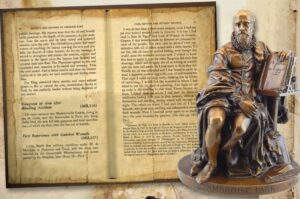Ambroise Paré: Father of Modern Surgery
Elizabeth Healy, MPH
Many historians and health care professionals regard Ambroise Paré as the father of modern surgery.
He gained increasing popularity while serving as a barber-surgeon in Paris; his reputation became so well acclaimed that he became the surgeon for many monarchs, including Henry II, Francis II, Charles IX, and Henry III. Paré was a pioneer in surgical techniques, battlefield medicine and was an expert in forensic pathology.
The following excerpt is taken from “The Case Reports and Autopsy Records of Ambroise Paré.” This collection of notes and observations originally published in 1575 in Paré’s native French, details his work and discoveries in treating battle and gunshot wounds (Figure 1). Also pictured is a bronze statue of Paré, both part of the collection housed by the Delaware Academy of Medicine and Delaware Public Health Association.

In this particular segment, readers are afforded a small window into Paré’s skill and inventiveness in wound treatment. Here, he recalls his first experience joining a military expedition and his subsequent first attempt at treating gunshot wounds. Heeding the advice of an earlier surgeon, Jean de Vigo, Paré applied a boiling mixture of oils prior to cauterization, which he noted would cause excruciating pain to his patient. Once he ran out of this oil solution, he resolved to use his own mixture of egg yolk, rose oil, and turpentine. The next day, the initial patients treated with the boiling oil we feverish, swollen, and in discomfort. The patients treated with his alternative mixture had rested well through the night and had little inflammation. Paré vowed from then on never to inflict the same pain on future patients through the use of the burning oil.